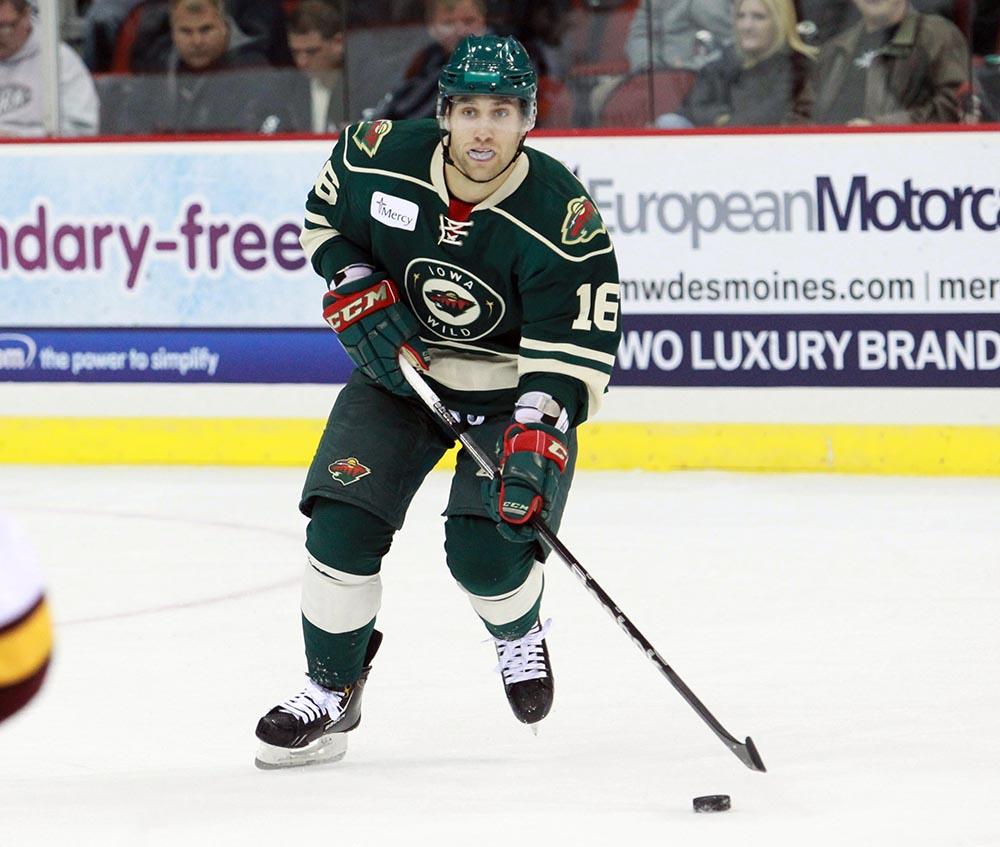by Tom Witosky || AHL On The Beat Archive
Jason Zucker knew the call would come, but even he couldn’t have expected it this quick.
Zucker, the third-leading scorer on the Iowa Wild’s roster, caught a flight to Ottawa early last Wednesday morning to join the Wild’s NHL parent club as it prepared for a match against the Senators. Zucker’s call-up was the result of an injury the night before to Torrey Mitchell during Minnesota’s 6-1 loss in Montreal.
Just hours before departing to return to the NHL, Zucker talked about his past, his present and his future following a long day of practice and conditioning inside Wells Fargo Arena in downtown Des Moines.
Zucker’s aggressive skating and ability to get shots on goal during the first Wild’s first 10 home games has endeared him to a lot of Iowa fans. But when Zucker pummeled Chicago Wolves defenseman Jani Hakanpaa with a series of quick right crosses after Hakanpaa boarded Wild teammate Brian Connelly, the mixed martial arts-trained Zucker immediately became a fan favorite.
“I always have high expectations and I hold myself accountable for those expectations,” the 21-year-old forward who grew up in Las Vegas said. “What I need to do is hold myself accountable and that is what I have done.”
But Zucker’s quick climb to the highest levels of professional hockey is also the result of how he has prepared himself over the years to become the first player from Nevada ever to be drafted in the NHL, and one of only two U.S. hockey players to ever win three gold medals in one year in international competition.
Zucker is in the second year of a three-year entry level contract, which was worth $2.5 million when he plays for Minnesota, according to CapGeek.com. He was the Wild’s second-round pick in the 2010 NHL Entry Draft.
“It’s always been hockey since my brothers got me to start playing roller hockey,” Zucker said, who climbed quickly to play for the U.S. National Development team as well as two years as a top player at the University of Denver.
It’s included an off-season regime of strength and conditioning training with some of the top names in MMA as well as with a top Nevada wrestling coach and a veteran boxing coach. It’s also about studying the psychology of sports performance — something that he wants to pursue after his hockey playing days are over.
“I have thought for a long time I want to get into sports psychology and work with athletes if possible later on. I am very interested in what makes athletes so good or what makes athletes so bad at any given time,” Zucker said.
And, it already has paid him dividends.
Zucker’s most memorable goal so far — the game-winning goal in the Game 3 of the Stanley Cup Playoffs last year against the eventual champion Chicago Blackhawks — came from a premonition. Zucker had been with the Minnesota club at the end of the season after scoring 50 points for Houston in the American Hockey League and was on the ice with forwards Matt Cullen and Pierre-Marc Bouchard.
With less than two minutes gone in overtime, Zucker dumped the puck into the far corner to Bouchard and knew he should get to the bench for a shift change.
“I was going to change, but something told me to stay out there,” said Zucker, who majored in psychology at Denver.
Instead, Zucker circled to a sharp angle to the right of Blackhawks goalie Corey Crawford and watched as Bouchard passed the puck to Cullen behind the goal. Cullen, despite being tripped, managed to push the puck to Zucker with a one-handed poke and Zucker took a slap shot.
“I didn’t even see it go into the net,” Zucker said with a laugh. “It’s a good thing it went in because if I hadn’t scored, I probably would have gotten yelled at for not doing a change.”
As for his somewhat off-beat method of off-season training, Zucker said the combining the three athletic combat disciplines not only has increased his stamina and quickness on the ice, but also provides him a way to deal with bigger men of the AHL and NHL.
“You never know when your body is going to be in a weird position and you are going to in that position for a half-second,” Zucker said. “But if you can hold it a little longer, you might get a chance to put the puck into the net.”
Zucker, who is 5-foot-11 and 188 pounds, also determined early on he wouldn’t be “known as a guy who can’t defend himself.”
“I am not going to be the kind of a guy who fights every game, that is not what I do,” he said. “But if a situation comes about like it has in the past, I don’t mind doing it.”
Most memorably for Iowa Wild fans, that happened when the 6-foot-6, 227-pound Hakanpaa crashed Iowa’s Connelly into the boards from behind. A nearby Zucker immediately grabbed Hakanpaa, turned him around and delivered the series of punches.
Zucker spent the next 17 minutes in the penalty box, but didn’t hear any complaints.
“Jason is physical player and it has worked for us this year and also against us a little bit,” Kurt Kleinendorst, the Iowa Wild’s head coach, said. “I really don’t mind those kinds of penalties. He plays the game the way it is supposed to be played.”
Kleinendorst said that Zucker’s time in the AHL so far has been good for him as well as an indication of the strength of the Minnesota organization. A groin pull during training camp prevented Zucker from competing at a high enough level to justify keeping him on the NHL roster, Kleinendorst said.
“I don’t think we ever saw him play to his potential in camp,” Kleinendorst said. “So when the time came to make a final decision, Jason was the odd man out.”
Kleinendorst also said that Minnesota, which is battling with Chicago for first place in the NHL’s Central Division, doesn’t need to rush Zucker up into the league.
“You can’t spend too much time American League, but you can spend too little time,” Kleinendorst said. “Minnesota is now at a point where they are comfortable making sure their players are spending at least as much time here as they need and, sometimes, too much time. It shows that the organization is in a good place.”
Zucker doesn’t disagree.
“I could blame my groin for getting hurt or a whole lot of other things. I could blame anything that I want, but it doesn’t make me a good hockey player. What I need to do is hold myself accountable and that is what I have done.”
Since the start of the AHL season, Zucker had eight points in 12 games and missed playing in two because of an AHL suspension. “That’s not too bad,” he said. “But it can be better.”
He also said that he isn’t frustrated or in a shooting slump.
“I get frustrated when I don’t get scoring chances, but I have been getting those,” Zucker said. “In my mind, a slump is just a state of mind. It has nothing to do with what you are doing; it has everything to do with how you prepare for every game.”
Whether Zucker is likely to stay up with Minnesota or come back down I-35 to rejoin Iowa is up in the air. In replacing Mitchell in the lineup, Zucker had an impressive night as his speed created several scoring chances including one that he gave up on a pass.
But Kleinendorst said that Zucker’s aggressive style and his work ethic already has given the club a clear view of his potential.
“He has the ability to be the best forward on the ice,” Kleinendorst said.






































